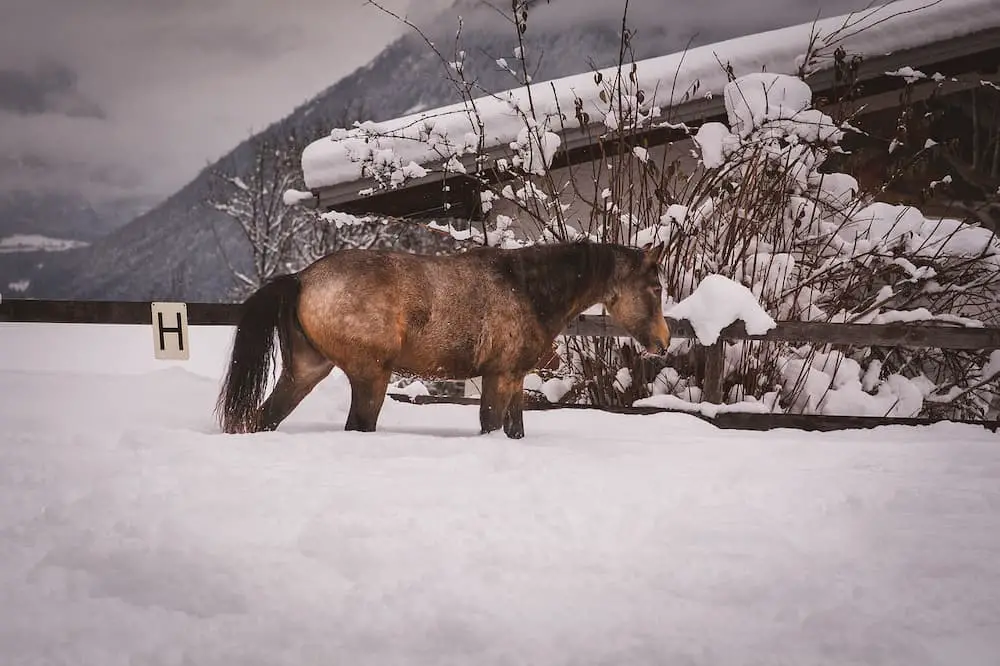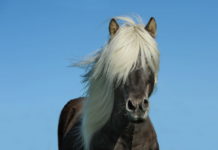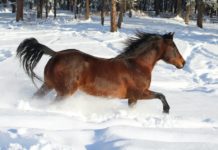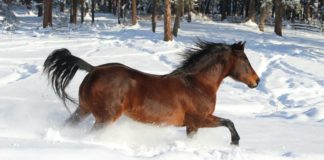What Happens If A Horse Gets Too Cold In The Winter?
If you’ve been around horses for a while, you’ll probably know that despite being such large and powerful animals, they can suffer from a staggering number of illnesses and ailments. And unfortunately, every season brings its own healthcare concerns, whether it’s disease-carrying insects in the summer or the harsh chills of winter.
We’ll look at the most common health concerns a horse can face during the winter season and what horse owners can do to prevent, recognize, and these threats.
Horses Can Suffer From Dehydration In The Winter
Some people can be surprised to know that dehydration can be a problem for horses during winter. While most people usually think of summer sweat as a major dehydrator, dehydration is just as if not more of a problem during the winter, depending on the temperature where you live.
A horse that weighs around 1000 lb. typically needs 10-12 gallons of water a day to maintain optimum health. It doesn’t take much for a horse to start suffering from mild dehydration; Horses that lose 3-4% of their body moisture can be enough to negatively affect their well-being.
Keep A Horse Hydrated During Winter
The most common cause of dehydration during the winter is frozen buckets and freezing cold water.
While many horses can drink cold water, they’ll drink a lot more water if it’s slightly warm – about 45 F- 65 F. Avoiding cold water is not necessarily a bad move on their part, as a horse would need to burn precious calories to warm up after a cold drink, but you still want the horse comfortable enough to drink as much as they need to.
Using a heated automatic waterer, immersion heaters (a water heater that’s used for a regular water trough), insulated buckets, or simply adding hot water from a kettle are all good ways to keep water at a tempting temperature.
If you’re worried about freezing temperatures and you don’t have electrical service at the barn, you can use a large ball like a Jolly Ball which floats in the trough, allowing horses to move the ball with their nose, which leaves a muzzle-sized drinking hole. The horse may get some entertainment from it too. Other than that, you could keep a hammer and a sieve beside the water trough – but you’ll need to break the ice every so often and scoop out the frozen shards so they don’t damage the horse’s sensitive gums and mouth.
Encouraging A Horse To Drink More Water In Winter
Other than keeping the water at a reasonable temperature, there are a few tricks that can be used to encourage a horse to drink more water. By adding flavoring, like apple juice, that’s used to help travelling horses acclimatize more readily to unknown water sources and can help make winter water more tempting.
Keeping some free-choice salt available may encourage a horse to drink more, it also helps to ensure that they’re still getting their much-needed minerals. About 2oz of loose salt for a 1000 lb horse should be enough to help stimulate their appetite.
Another trick is to sneak moisture into their diet using other methods, like soaking or steaming their hay. This adds valuable moisture while making the forage more digestible. Soaked hay cubes or sprouted fodder are other useful ways of introducing extra moisture into a horse’s diet.
You shouldn’t rely on a horse to eat snow as a supplement for drinking water. While a horse will ingest some occasional mouthfuls of snow, eating too much snow can cause a drop in their internal body temperature, forcing their body to burn more calories just to stay warm.
Winter And Impaction Colic
Although colic can happen any time of the year, there are certain concerns that can be prevalent in winter that may increase the likelihood of colic. One of the more common types of winter colic is impaction colic.
As the name implies, impaction colic is caused by a blockage in the horse’s intestinal tract, preventing the horse from moving properly— this happens as gas and food builds up, causing pain and a distended stomach.
Preventing Colic In The Winter
The methods for reducing the chances of a horse suffering from impaction colic in winter is largely the same as any other time of year; this includes lots of forage-fed little and often, plenty of turnouts and hydration.
Problems can be caused during winter because of the changes in management practice. A good example is grass-kept horses that need to be brought inside or confined to stalls and sheds during the first snowstorm, which could cause colic.
When focusing on forage, try eliminating or reducing grain in favor of hay is a great place to start. Having regular hay available helps to keep the intestines moving, which is important for preventing colic.
Winter And Respiratory Problems
Although respiratory problems can occur at any time of year – some experts believe that as many as 80% of stall-kept horses during the winter will suffer from some kind of respiratory issue. However, there are a few factors specific to winter weather and changing management practices that could make breathing problems, like coughing and heaving, even more, problematic during winter.
Preventing Winter Respiratory Problems
There are some good practices horse owners can use to prevent winter respiratory problems:
- Keep the shed windows & doors open as much as possible.
- If there are split stall doors, keep the top half open.
- If drafts are becoming a problem, consider using a blanket or old cooler over an open window to reduce the chill while still allowing ventilation.
- If a horse gets chilly, add an extra blanket and close any windows.
When keeping a horse in the barn, store dusty things like hay, straw, and shavings away as far as possible. Not only will this improve the fire safety of the barn, but it’ll also minimize unnecessary dust.
Winter Rain And Fungal Infections
If you live in a part of the country that gets a lot of rainfall during the winter, then there’s a higher chance of a horse getting scratches or rain rot. While neither of these afflictions is directly caused by the rain itself, the bacteria that causes dampness to thrive in environments that often happen during winter.
Winter And Rain Rot
While rain rot in itself normally isn’t a huge problem, it can get out of hand if the environment is damp. Common signs include flaky skin, bald spots, or tufts of hair falling out. This can cause a horse to rub against fence posts or doors to try and alleviate the itch.
Horses can get rain rot in the winter if they’re left outside without adequate shelter (however it can still happen when despite your best efforts, they still prefer to stand outside in the cold and the rain).
How to Prevent Rain Rot
To prevent rain rot, only use enough blankets as necessary and change blankets often. While a wardrobe of winter blankets is pricey, consider using lightweight coolers as a layer under the more expensive outer layers.
Horse Injuries During Winter
Horses are known for having accidents in winter. Winter conditions can present a few more unique concerns in terms of injuries, normally caused by poor footing conditions.
Horses can slip and fall on ice, hard-packed snow and slippery grass, especially if the horse is wearing shoes year-round.
Preventing Winter Injuries
You can help to prevent a horse from slipping and falling by ensuring your horse has adequate footing and traction.
Areas of the barn or stable that are prone to ice, can be covered with sand or salt. If you can, you should remove any snow before it has a chance to compact, or at least shovel horse-sized walkways for common routes and focus on keeping those areas as slip-free as possible.
Senior Horse Can Suffer From Aches And Pains
Any owner of a senior horse knows how cold, damp weather can be unkind to joints. For senior horses or even middle-aged horses that have had a competitive past, winter chills can exacerbate arthritis or other sore joint.
Preventing Winter Joint Problems
While you can’t stop your horse from aging, there’s still plenty you can do to support healthy joints.
As a horse ages, it may be necessary to restrict or reduce their workload, for example, smaller fences, fewer sharp turns, or going down a maybe going down a competitive level to help your horse age better.
Thrush In The Winter
Although thrush can happen any time of year, the wet and muddy winter conditions, along with increased stall time that usually accompany winter, can increase the likelihood of foot infections.
Preventing Winter Thrush
To help prevent the horse’s likely hood of getting thrush, a horse should be kept in a living area that is as clean and dry as possible.
Laminitis And Founder
Laminitis is an infection of the foot and can result in founder, which is an excruciating condition in which the coffin bone in the middle of the horse’s foot becomes unstable and begins to rotate.
Laminitis can be a problem in winter if your horse’s grain ration isn’t cut back along with the decrease in exercise that most horses lack in the winter.
Preventing Laminitis
Too much grain, along with insufficient exercise or energy burn, may lead to this painful condition.
Non-working horses should have their grain ration severely reduced or eliminated altogether throughout the winter unless they’re a “special circumstance” unless it’s an older horse.
Conclusion
Although there’s never a “bad” season when it comes to owning a horse, winter can bring its own unique challenges to keeping a horse healthy and happy. It’s important to recognize how important horse management is, for keeping a horse healthy.





